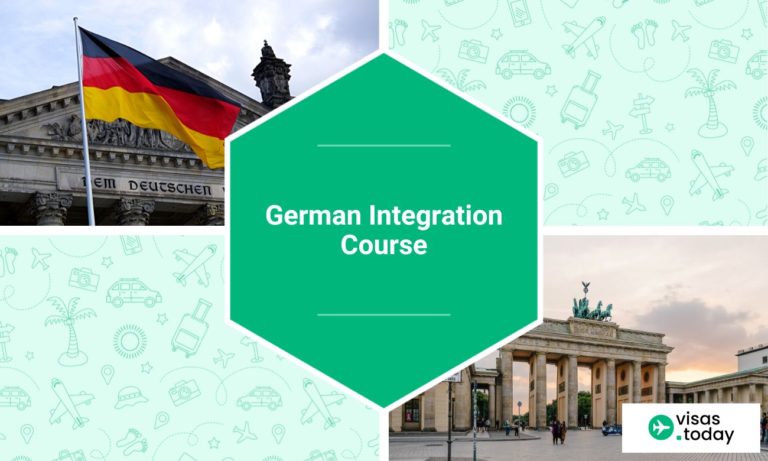People who intend to study, work, or live in Germany should have a basic understanding of the German language as well as know their culture, laws, and traditions. To give people the opportunity, the German government created German Integration Courses which are required for a huge number of people relocating to Germany. If you are one of them, read this article to find out what exactly is the German Integration Course, its types and regulations.
- German Integration Certificate – what is it?
- Categories of German Integration Courses
- Who can participate in the German Integration Course?
- How do I register for a German Integration Course?
- How much is the German Integration Course?
- Other Integration Courses In Germany
- What after completing the German Integration Course?
German Integration Certificate – what is it?
The German Integration course is a monthly school-like system of classes in which students study the German language, culture, traditions, and laws. The goal of this course is to help foreigners assimilate into German society by making it easier for them to enrol in schools and find work. The course regulations concern the level of course that should be taken, to the number of classes, the costs, and the final exam.
Categories of German Integration Courses
German integration courses are divided into two types:
- German language course – this course will teach you how to communicate in German. If you are learning German for the first time, you will need to attend 400 to 600 hours of courses, each lasting 45 minutes. If you want to pursue advanced classes, though, you’ll need to devote roughly 300 hours to your studies.
- German legal system, culture, and history course (the orientation course). The orientation course consists of 100 hours of courses, each lasting 45 minutes.
Who can participate in the German Integration Course?
An evaluation exam is required of all third-country nationals who wish to relocate to Germany. The evaluation exam assesses your German language skills as well as your knowledge of German culture. If you do not pass this exam, you will be required to enrol in German Integration Courses after you arrive in Germany. Non-German EU nationals are not required to complete these courses but they can if they wish to live in Germany.
How do I register for a German Integration Course?
First of all, you have to obtain a Berechtigungsschein certificate. If you are a non-EU citizen, you must register with the local foreigners’ registration office in Germany closest to your house. If you are a citizen of a member state of the European Union, you should contact Germany’s Federal Office for Migration and Refugees.
Second of all, find a course provider in Germany, this service provider is known as Kurstraeger. The Federal Office for Migration and Refugees has a website where you can identify source providers. Make sure you call the course that is closest to your home and contact them. This can be done over the phone, via email, or in person. The provider will ask you to provide a few documents before providing you with information about the registration process, the number of hours, the course curriculum, the fees that must be paid, and other pertinent information. Afterwards, fill out the registration form. To register for a course, follow the instructions provided by the course provider.
Now, you’ll be able to begin attending the class according to the timetable you’ve been given. However, before applying, you must ensure that you have the appropriate German visa and/or German residence permit.
How much is the German Integration Course?
Despite the fact that the courses are required, you will be responsible for paying for them on your own. You may be required to pay €1.55 or €1.95 per hour, depending on your nationality and the date you got your residence title, or you may be exempt from paying any cost.
For example, German nationals who participated in an integration course before July 1, 2016 and do not speak passable German are subject to pay €1.55 per hour fee as well as EU citizens who enrolled in an integration course before July 1, 2016 and wanted to learn German in Germany. While German nationals enrolled in an integration course after July 1, 2016 who do not speak acceptable German have to pay a fee of €1.95 per hour.
Ethnic Germans, their spouses, and their children who have relocated to Germany and those who get unemployment compensation or other forms of social assistance are not required to pay any fees.
Other Integration Courses In Germany
There are also different sorts of German Integration courses available for specific groups of people relocating to Germany, such as:
- Language course for German residents who have not yet learnt German.
- Integration course with literacy skills for people who cannot read or write in any foreign language and are unfamiliar with the Roman alphabet.
- Intensive language course for people who can learn quickly.
- Integration course for mothers who want to know what their children are learning in kindergarten and school so that they may assist them with their homework.
- Integration courses for people under the age of 27 to learn more about school, training, work, career, family, and other topics.
What after completing the German Integration Course?
After you’ve completed all of your Integration course classes, you’ll need to take two exams. One test concerns “Living in Germany” and the other is about German language. If both are passed, you will be awarded the German Integration Certificate which is called “Zertifikat Integrationskurs”.


